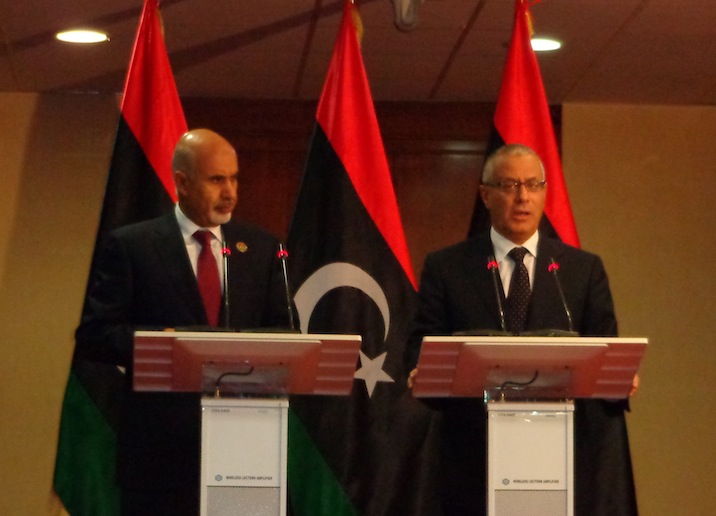By Michel Cousins.

Tripoli, 5 February 2013:
Members of the General National Congress have been forced to find temporary alternative accommodation because the . . .[restrict]main chamber is still being occupied by a handful of the revolutionaries who forced their way into the building during a debate on Sunday morning.
According to Congress President Mohamed Magarief, speaking this evening, Tuesday, at a press conference at the Prime Minister’s office, some 16 war-wounded revolutionaries were still in the main debating chamber today and refusing to move.
Members are now meeting in another part of the GNC site, it has been disclosed.
It was reported earlier today that war-wounded protestors yet again tried to force their way into the main building and had been prevented from doing so but had blocked Congress members from entering.
Sunday’s takeover was the second time Congress had been stormed in just over a week.
In a sign that their patience with such protests is wearing thin, both Magarief and Prime Minister Ali Zeidan this evening condemned what had happened on Sunday.
Congress had been taken by surprise when the protestors invaded the chamber and interrupted the debate of the 2013 budget, Magarief said. But members listened to the complaints and demands out of respect for what the demonstrators had gone through during the revolution and what they had suffered.
“We talked to them. We listened to them, to their requests and requirements. We listened despite their behaviour,” Maharief said. But no one had not expected them to be carrying weapons. Two or three pulled out guns and threatened a Congressman, he said.
Such behaviour was criminal, he inisted.
He did not name the member nor go into details. However, other Congress members have reported that the protestors were abusive and aggressive.
Congress members did everything to calm the atmosphere, Magarief said. “We tried to answer their questions. We were very tolerant,” he said. No one had wanted to use force against the protestors. “We cannot allow blood to be shed in the Congress.” But when “we asked them to leave the hall, they insisted on staying”.
He said that Congress would not work “under threats”. People had the right to express themselves, he said, but “not this way”. Moreover, such action delayed the work of Congress, he stated.
Zeidan agreed, saying what had happened in Congress was “extremely serious”. Moreover, if Congress did not pass the budget, there would be no money for the projects needed to get Libya back on its feet. As for sending war-wounded elsewhere for treatment, the government was doing its best, he said. But it could not force foreign governments to grant visas, especially when some of the wounded had caused trouble abroad.
[/restrict]







